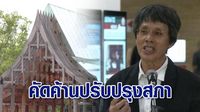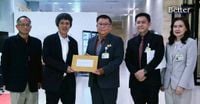On May 8, 2025, the Thai Parliament's cafeteria project, overseen by national artist Chatree Ladalalitsakul, is undergoing significant renovations aimed at enhancing efficiency and functionality for its members. This initiative is part of a broader budget plan that includes 15 projects to improve various facilities within the Parliament, totaling nearly 1 billion baht.
The cafeteria project, specifically, is set to address long-standing issues such as water leakage and the need for better kitchen facilities, with an estimated cost of 100 million baht. Chatree, who has been involved in the cafeteria's design and oversight for a decade, emphasizes the importance of creating a sustainable and aesthetically pleasing environment for parliament members.
Chatree stated, "The cafeteria is not just a dining area; it is a space that needs to reflect the values and functionality of the Parliament itself." He highlighted that the renovations will incorporate passive design principles to ensure energy efficiency, aligning with the Parliament's goal of being an environmentally conscious institution.
In addition to the cafeteria, the Parliament is also planning to renovate the Sala Kaew, a ceremonial space that has faced criticism for its lack of operational use despite a proposed budget of 123 million baht for improvements. The Sala Kaew is intended to host important events but has remained underutilized due to its exposure to the elements.
Apatt Sukhanan, the Secretary of the House of Representatives, acknowledged the challenges surrounding the Sala Kaew, stating, "While it is not currently operational, we plan to upgrade it with air conditioning to better serve our guests in the future." This renovation is part of a larger budget proposal that the Cabinet has approved, which includes various enhancements across the Parliament's facilities.
Critics have raised concerns about the appropriateness and necessity of the renovations, particularly regarding the funding sourced from taxpayers. Observers noted that the area surrounding the Sala Kaew is currently unkempt, with algae growth and litter, which raises questions about the management of public funds.
The proposed budget for the 2025 fiscal year includes ten significant projects, with the Sala Kaew renovations being a focal point. Other projects include enhancements to the Parliament's museum, improvements to audiovisual systems in meeting rooms, and upgrades to the cafeteria itself.
Chatree has expressed his disapproval of the proposed modifications to the building's design, particularly the idea of relocating the library to the first floor and filling in the Emerald Pool to create additional space. He argues that such changes would compromise the building's architectural integrity and its purpose as a symbol of contemporary Thai architecture.
During a presentation to the Senate's Committee on Religion, Ethics, Arts, and Culture, Chatree elaborated on his concerns, stating, "The Emerald Pool was designed with specific environmental considerations in mind, and filling it in would disrupt the building's passive cooling system that is vital for energy efficiency." He further explained that the pool plays a crucial role in maintaining a comfortable climate within the building, especially given its large size and open design.
Chatree's opposition to the renovation plans stems from a belief that they would lead to unnecessary expenditures without providing tangible benefits. He noted that the library's current location on the 9th and 10th floors is strategically placed to connect with the archives on the 8th floor, making it easily accessible for members of Parliament and staff.
Moreover, he pointed out that relocating the library would not significantly enhance public access, as the library is already within a secure area that requires visitors to go through security checks. If the goal is to improve public access, he suggested that the library should be moved outside the Parliament building entirely, similar to how museums operate.
Chatree also raised concerns about the potential structural implications of relocating the library, given that it would require significant alterations to the existing building framework. He warned that such changes could compromise the building's overall stability, especially in terms of its earthquake resistance.
In light of these arguments, Chatree urged the Parliament to reconsider its approach to renovations, emphasizing the need for transparency and consultation with design professionals to preserve the architectural significance of the Parliament building. He believes that any modifications should be conducted with careful consideration and respect for the original design intent.
As the debate over the renovations continues, it remains clear that the future of the Thai Parliament's facilities is at a crossroads. With significant investments on the table and public scrutiny increasing, the decisions made in the coming months will have lasting implications for the institution and its role in Thai society.
Ultimately, the goal is to create a Parliament that not only functions efficiently but also stands as a testament to Thailand's architectural heritage and commitment to sustainability. As Chatree aptly puts it, "We must honor the legacy of our buildings while adapting them for future generations."





